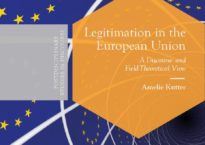Exercise in complexity and contingency: the example of the MES-Viadrina snap-shot simulation of EU legislation on asylum and migration
This paper, presented by Amelie Kutter at the DVPW Congress 2021, suggests that a neglected, but promising, potential of EU simulations is their function as exercises in complexity and contingency. If designed appropriately, simulation games not only reveal the complexity and contingency of EU politics (cognitive learning), but also the complexity and contingency of thinking about EU politics (cognitive-reflexive learning). Drawing on the example of a snap-shot simulation of the first reading of the EU’s New Pact on Asylum and Migration that was carried out as part of the lecture class ‘Introduction to the politics of the European Union’ at the MA European Studies unit of European University Viadrina, I will show such learning objective can be fostered in simulation game design.
